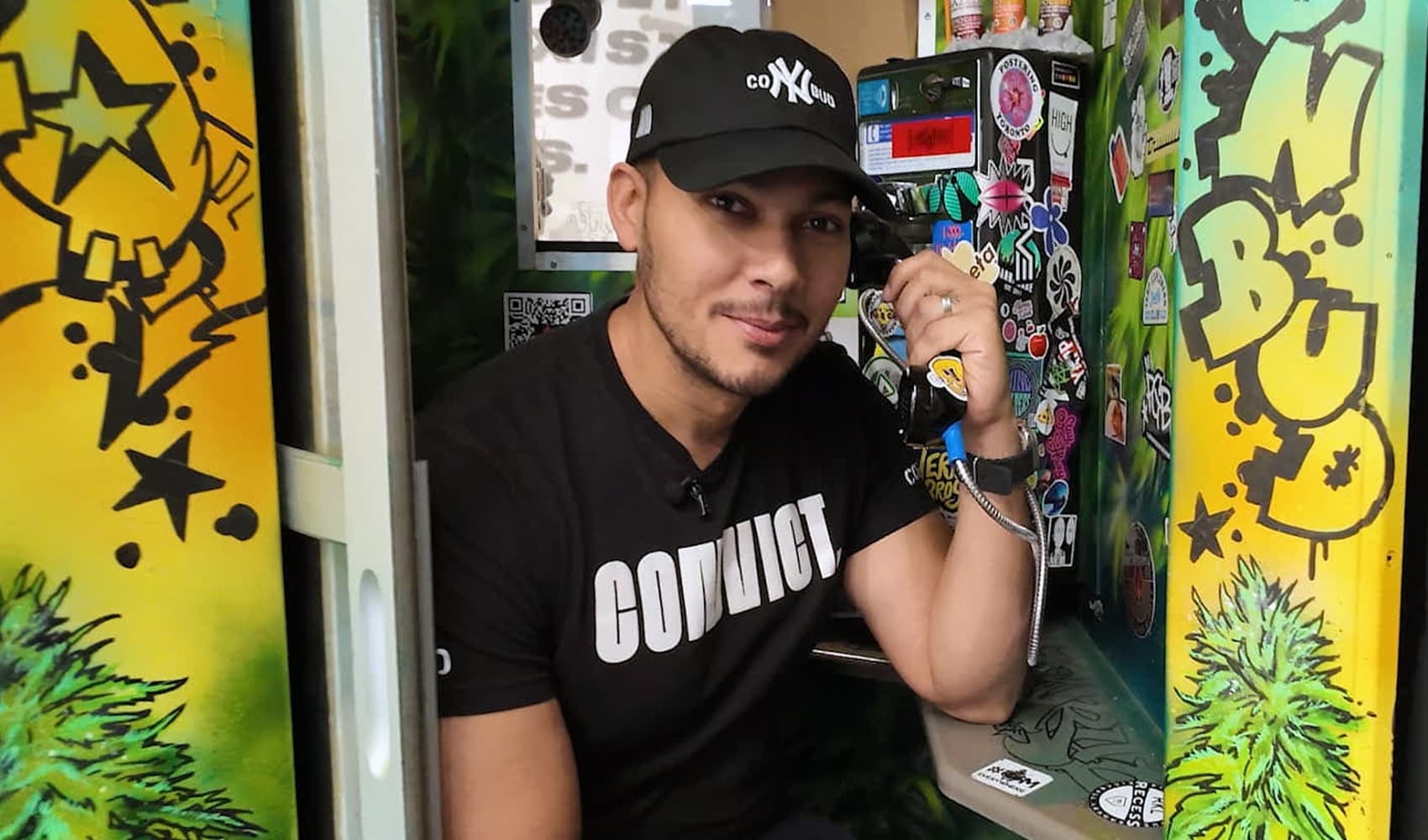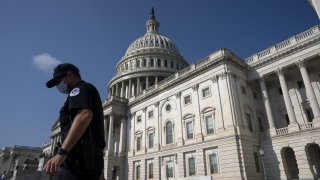
CNBC's live coverage in this blog has ended.
U.S. Army General Gustave Perna has called today D-Day, a reference to the Allied landing in France during WWII — the beginning of the end in a historic battle against an enemy that has taken hundreds of thousands of lives and threatened basic freedoms.
For UPS, today is the "moment of truth" after months of logistical planning.
The United States' government, with the help of UPS and FedEx, is now moving rapidly to deliver millions of doses of Pfizer's coronavirus vaccine, an accomplishment that President Donald Trump praised as a "medical miracle." House Speaker Nancy Pelosi is now calling for the invocation of the Defense Production Act to accelerate manufacturing of the vaccine.
It's now a race against time as thousands of people die every day, alone and separated from their families, from a virus that has devastated communities in every corner of the nation and shaken America's way of life to its core.
Though help is on the way, the situation is expected to get much worse before it gets better. At least 3,300 deaths from the virus were recorded on Friday and more than 231,000 new cases were reported, stretching the U.S. health-care system to the brink.
With a hard winter ahead, CDC advisors are sounding alarm bells that there's still not enough federal funding to help local authorities carry out the vaccination campaign. Congress remains at an impasse over a new stimulus package that would include such funding.
The following data was compiled by Johns Hopkins University:
- Global cases: More than 71.2 million
- Global deaths: More than 1.5 million
- U.S. cases: More than 15.8 million
- U.S. deaths: More than 295,000
Here's what you need to know:
- D-Day: Army general says vaccine beginning of end for virus
- First vaccine shipments arrive Monday at U.S. locations
- For UPS, the "moment of truth"
- FDA chief: Vaccine authorization not due to external pressure
- Patients must receive two shots for full protection: FDA
- Here's who will get the vaccine first
- Allergies: Injection okay unless you've had reaction to a vaccine
- Trump praises vaccine as "medical miracle"
- Pelosi: Time to invoke Defense Production Act
Republicans and Democrats agree on vaccine money, but stimulus deal remains elusive
Money Report
A bipartisan group in Congress agrees on the need for billions of dollars to support a mass vaccination campaign in the U.S., as CDC advisors warn there's no where near enough money at the local level for officials to implement such an undertaking.
The most recent proposal from the bipartisan group, a $908 billion stimulus package, includes $6 billion for vaccine development and distribution, as well as $35 billion to support health-care providers. However, Sen. Majority Leader Mitch McConnel opposes that proposal and has called instead for an agreement that excludes provisions on liability protections for businesses and funding for state and local governments.
As Congress struggles to reach a deal, the first vaccines are expected to begin arriving at sites across the nation on Monday. State and local health departments as well as health-care providers will need much more money to administer vaccines as the programs ramps up, members of a CDC advisory panel warned on Saturday.
— Spencer Kimball
People should still wear masks and social distance after vaccination, CDC says
People who are vaccinated against Covid-19 will still need to practice current recommended public health guidance to prevent the virus' spread, like wearing masks, social distancing and avoiding crowds, a U.S. Centers for Disease Control and Prevention officer said.
That's because there's limited information on how well the vaccine will work once in the general population; how much it may reduce disease, severity or transmission; and how long protection lasts, Dr. Sarah Mbaeyi, a CDC medical officer, told the agency's Advisory Committee on Immunization Practices.
Protection from the vaccine won't be immediate, Mbaeyi added, saying "it will take one to two weeks following the second dose before a person is considered fully vaccinated."
"Additionally, as no vaccine is 100% effective, some vaccinated people may still get Covid-19 disease," Mbaeyi said.
— Noah Higgins-Dunn
States will need more funding for their vaccine plans, CDC advisors says
State and local health departments, as well as health systems and providers, will need more government funding to carry out coronavirus vaccinations, members of a key group of advisors to the U.S. Centers for Disease Control and Prevention said.
The comments came after the members of the Advisory Committee on Immunization Practices voted to recommend Pfizer-BioNTech's Covid-19 vaccine for people 16 years and older. Dr. Peter Szilagyi, an ACIP member and a pediatrician at the University of California Los Angeles, said that he wanted to reemphasize the "need for substantially increased government funding to actually implement the recommendation."
"I know we're going to have very tough and sad times ahead because of the surge and a limited vaccine supply, but I am really hopeful that this is the beginning of the end of the coronavirus pandemic," Szilagyi said.
Dr. Beth Bell, an ACIP member and a clinical professor of global health at the University of Washington, echoed Szilagyi's remarks, saying it's not unfair to compare the amount of funding the federal government provided for the vaccine's development compared to the little funding dolled out for administering the shots.
"I think that the imbalance between that kind of money and the funding that has been provided for the vaccination programs and for implementation is really shocking and needs to be corrected because we are not going to be able to protect the American public if we don't have a way to deliver the vaccines to them," Bell said.
— Noah Higgins-Dunn
CDC panel recommends Pfizer vaccine, clearing another major hurdle
A key panel at the U.S. Centers for Disease Control and Prevention has backed Pfizer's Covid vaccine for people 16 years and older, less than a day after the Food and Drug Administration issued its emergency use authorization for the vaccine.
The CDC Advisory Committee on Immunization Practices, a panel of medical experts that advises the agency, recommended the Pfizer vaccine in an 11-0 vote. Earlier this month, the panel voted 13-1 to give health-care workers and residents at long-term care facilities the vaccine first once cleared for public use.
—Spencer Kimball
People who contracted Covid should still get vaccinated, CDC says
Clinical data from Pfizer-BioNTech's coronavirus vaccine trials shows that it's safe and likely efficacious for people who were once infected with the virus to get vaccinated against the disease, a U.S. Centers for Disease Control and Prevention officer said.
Dr. Sarah Mbaeyi, a CDC medical officer, told the agency's Advisory Committee on Immunization Practices that vaccines should be offered to people "regardless of history of prior symptomatic or asymptomatic" coronavirus infection.
Mbaeyi told the panel, however, that a diagnostic or antibody test isn't recommended to decide whether someone should get the vaccine. Someone who's infected with Covid-19 and has symptoms should wait to get vaccinated until they've recovered and finished isolation, according to a presentation at the meeting.
Since current evidence suggests that Covid-19 reinfection is uncommon 90 days after someone is infected, someone "may delay vaccination until near the end of this period if desired," Mbaeyi said.
— Noah Higgins-Dunn
U.S. to maintain reserve of Covid vaccine doses as safeguard against distribution problems
The U.S. will for now maintain a reserve of more than 50% of coronavirus vaccine doses manufactured in the event there is spoilage as Pfizer's vaccine begins being distributed nationwide this weekend, Army Gen. Gustave Perna said at a press conference.
The reserve includes the second doses to be given individuals, who need two shots for the vaccine to work as designed, as well as additional doses.
"Do I think something is going to occur? I do," said Perna, who oversees logistics for the government's vaccine effort Operation Warp Speed. "Hence the reason why I maintain some reserve stocks so I could adjust and adapt and make sure that the American people have access to the vaccine and immediately -- or as soon as I can."
Perna said that currently officials "don't have an absolute confidence in the cadence" of distributing vaccines without spoilage, not because [vaccine makers] Pfizer ... or Moderna are not diligent in their process, but it is such a delicate process."
"We want to ensure perfection in the vaccine because we do not want anything going into an arm that would be a problem," he said.
But Perna said, "I see reserve dwindling every day as we move forward" and gain confidence in the distribution of the vaccine.
"My goal is to drive that down because we want no vaccines on the shelf," he said.
— Dan Mangan
Covid-19 vaccines could be delivered to all U.S. providers within three weeks, Gen. Perna says
Operation Warp Speed Chief Operation Officer Gen. Gustave Perna said that the Covid-19 vaccine could be delivered to all U.S. providers within three weeks and about 40 million doses could made available for distribution by the end of the year.
About 3 million shots are set to ship across the country this week in the initial rollout. Locations to receive shipments include hospitals and local pharmacies that meet ultra-cold storage standards for the vaccine.
"I feel confident that as we do the initial shipments this week and then hopefully following with the Moderna vaccine, we will begin to blossom expansion of delivery throughout the states to ensure greater access to the vaccine availability for everybody," Perna said during a Saturday press briefing.
Nearly 100,000 Americans already participated in clinical trials across the country to receive the vaccine.
"We are not done until every American has access to the vaccine, until every American that wants it, receives it," Perna said. "This is our goal, we work every day to achieve it."
— Emma Newburger
FAA says pilots can take Pfizer's vaccine
The Federal Aviation Administration has cleared pilots and air traffic controllers to take Pfizer's coronavirus vaccine. They needed the FAA's approval before taking the vaccine or risk losing their medical certificates that are required to fly.
The FAA said it will require an observation period of 48 hours after each of the two doses before pilots and air traffic controllers can perform their duties.
"The FAA anticipates taking no additional measures to ensure safety after the initial window for side effects closes," the agency said Saturday. "However, the agency's medical professionals will continuously monitor the initial distribution of the novel vaccine and documented clinical results and will adjust these recommendations as needed."
Pilot and other aviation-industry unions are urging officials to provide priority access to the vaccine for their members.
The FAA said it will evaluate vaccines from other manufacturers as they're cleared by the Food and Drug Administration.
—Leslie Josephs
First vaccine shipments will arrive in U.S. on Monday, Gen. Perna says
The first vaccine shipments will arrive to U.S. providers on Monday morning, General Gustave Perna, chief operating officer for the Defense Department's Project Warp Speed, announced on Saturday.
"Make no mistake, distribution has begun," Perna said during a press briefing. "Right now boxes are being packed and loaded with vaccine with emphasis on quality control."
Within the next 24 hours, vaccine shipments will move from Pfizer manufacturing facilities to the UPS and Fed Ex hubs.
The vaccine will arrive to 636 locations nationwide this week, with 145 sites receiving shipments on Monday, another 425 sites on Tuesday and the final 66 sites on Wednesday, Perna said.
Kits that include needles, syringes, diluent and other supplies to administer the shots have already been delivered to the first sites, according to Perna.
— Emma Newburger
D-Day for coronavirus vaccine: Army general says distribution is beginning of end for Covid
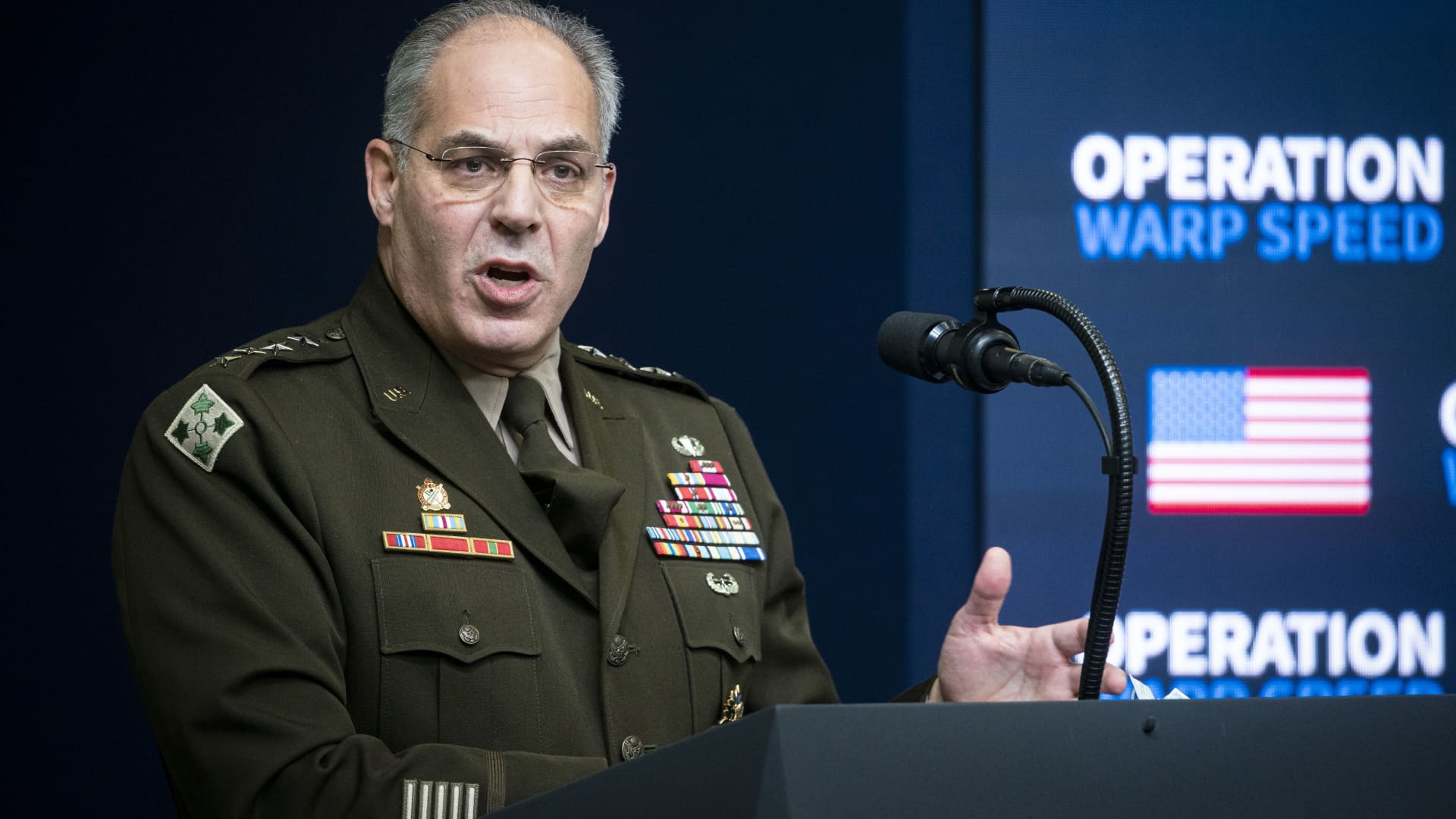
The Army general in charge of logistics for Operation Warp Speed called Saturday "D-Day," or "the beginning of the end" of the coronavirus epidemic as authorities began packaging newly approved vaccines to begin being shipped around the country.
"Today is truly a historic day," said Gen. Gustave Perna at a briefing by the Health and Human Services Department, which was held the morning after the Food and Drug Administration issued emergency use authorization approval to the Covid vaccine for Pfizer and BioNTech.
"As I speak today right now, vaccines are being packaged with a lot of emphasis on the quality assurance to that end, tomorrow morning vaccines will start rolling from manufacturing to distribution hubs," Perna said. "And then Monday, vaccines will be received."
Perna noted that he has repeatedly used the term D-Day — the name for the day that Allied forces invaded Normandy Beach in France during World War II — to talk about the day vaccines would start being shipped.
But the "D" does not stand for "distribution," as many had assumed, Perna said.
Instead, D-Day in the military designates the day "the mission begins."
"D-Day was the beginning of the end, and that is where we are today," Perna told reporters.
"We have a lot of work to do. We are not taking a victory lap."
— Dan Mangan
Providers will need to council pregnant women on whether they should get vaccine, FDA says
Medical providers will have to council pregnant women on whether it's beneficial for them to receive Pfizer's coronavirus vaccine, U.S. Food and Drug Administration officials said during a press briefing.
Dr. Peter Marks, director of the FDA's Center for Biologics Evaluation and Research, said that there were not enough pregnant women or women who became pregnant during the vaccine's clinical trials to determine whether they should be vaccinated. He added that pregnant women should discuss with their medical providers the "potential benefits and the potential risks" of being inoculated with the drug.
"I think then if that conversation happens, I think the provider and that individual can make a decision about whether the benefits outweigh the risks because certainly Covid-19 in a pregnant woman is not a good thing," Marks said.
"So someone might decide that they would like to be vaccinated, but that's not... something that we're recommending at this time, that's something we're leaving up to the individual," Marks said.
— Noah Higgins-Dunn
UPS says now is 'moment of truth' as it prepares to deliver Pfizer vaccine doses
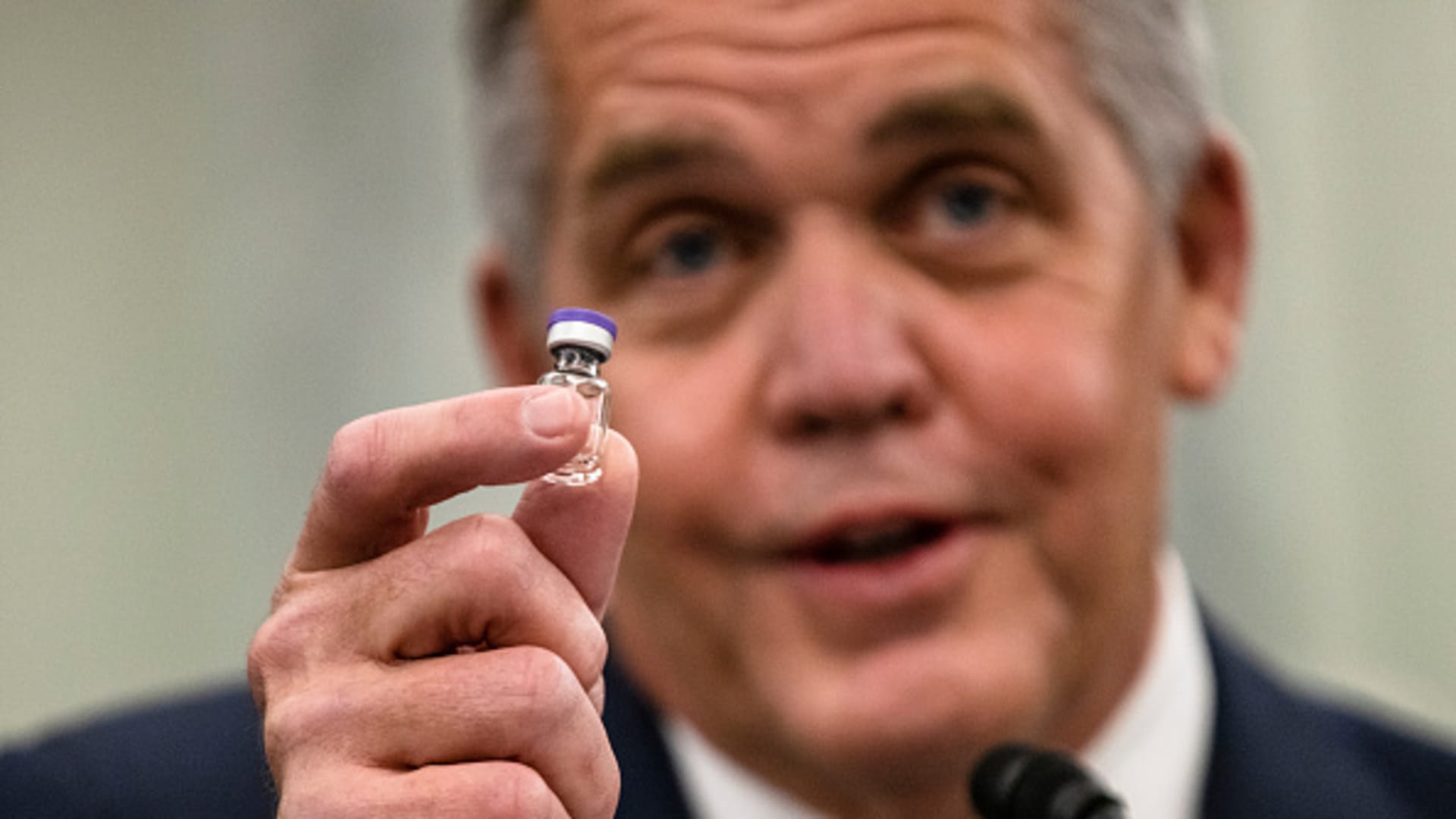
UPS will begin shipping doses of Pfizer-BioNTech's Covid-19 vaccine in the coming days, saying now is "the moment of truth" following months of logistical planning.
The company said in a statement that the vaccine doses will start at storage sites in Michigan and Wisconsin. From there, they will be to moved to UPS facilities in Louisville where doses can be expedited by air "to select destinations, including hospitals, clinics and other medical facilities, to inoculate healthcare workers."
UPS has already distributed vaccine administration kits with supplies such as syringes, masks, sanitizer and a diluting agent required to administer the doses, spokesman Jim Mayer told CNBC on Thursday. The company will also provide vaccination sites that don't have the necessary freezers to store the vaccine at ultra-cold temperatures with dry ice, Mayer said.
"This is the moment of truth we've been waiting for at UPS," Wes Wheeler, president of UPS Healthcare, said in a statement. "We have spent months strategizing with Operation Warp Speed officials and our healthcare customers on efficient vaccine logistics, and the time has arrived to put the plan into action."
— Noah Higgins-Dunn
FDA chief urges people 'to remain vigilant' despite vaccine authorization
U.S. Food and Drug Administration Commissioner Dr. Stephen Hahn urged people to "remain vigilant" against Covid-19 and to continue following recommended public health guidance even as the U.S. prepares to distribute Pfizer's vaccine.
"While our federal partners are already taking steps to distribute this vaccine, we remind the public to remain vigilant as inoculation will take time," Hahn said during a press briefing. "Wear a mask, wash your hands and remain socially distant when possible; protect yourself, the vulnerable and others."
There should be enough doses for most Americans who want to be vaccinated by late March or early April next year, experts like White House coronavirus advisor Dr. Anthony Fauci have said. Earlier this week, Fauci said that the U.S. could get the pandemic under control by the "back half of 2021" if enough people are vaccinated in the spring.
— Noah Higgins-Dunn
FDA confident in maintaining cold-chain requirements for vaccine
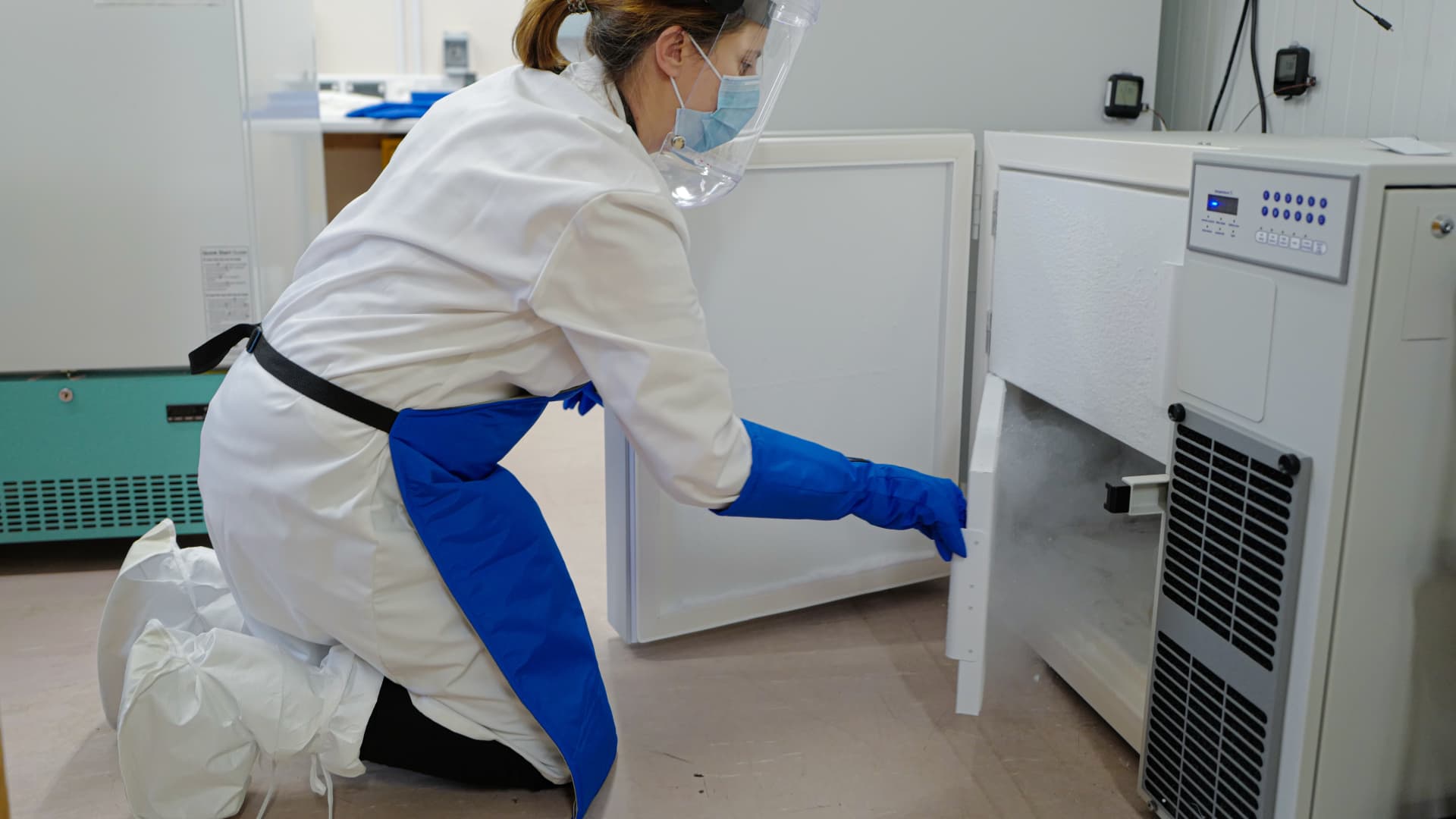
The FDA is confident that it will meet cold-chain requirements for the Covid-19 vaccine as it prepares nationwide distribution, according to Dr. Peter Marks, director of the Center for Biologics Evaluation and Research at the FDA.
The Pfizer vaccine must be stored at minus 94 degrees Fahrenheit and can be kept in a regular refrigerator for a number of days once it thaws.
"We've seen cold-chains maintained in locations that are pretty rural or pretty rough, for instance with vaccine campaigns in Africa," Marks said during a press briefing on Saturday. "We're hopeful that this is going to work out."
Vaccines will originate from Pfizer storage sites in Michigan and Wisconsin and will travel by air and truck to hospitals and other medical facilities to inoculate health-care workers across the country.
— Emma Newburger
People with allergies can receive injection unless they've had severe reaction to a vaccine: FDA
Dr. Peter Marks, director of the Center for Biologics Evaluation and Research at the FDA, said that people can receive the Covid-19 vaccine unless they've had severe allergic reactions to a vaccine or one of its components.
Marks said that people with a history of allergic reactions should consult their doctor to determine if they should receive a vaccine. About 1.6% of the U.S. population has had some sort of severe allergic reaction to food or an environmental factor, he said, and the FDA doesn't want to exclude those people from getting vaccinated.
"We feel comfortable telling people they can receive the vaccine unless they've had severe reactions to a vaccine or one of the components in it," Marks said.
The FDA will ensure that sites administering the Covid-19 vaccine will be equipped to treat allergic reactions if they happen, Marks said. He also noted that though there were a few reactions to the vaccine in Britain, such reactions were not seen in larger clinical trial data sets.
— Emma Newburger
Trump calls Pfizer vaccine a medical miracle, says it will end Covid in America
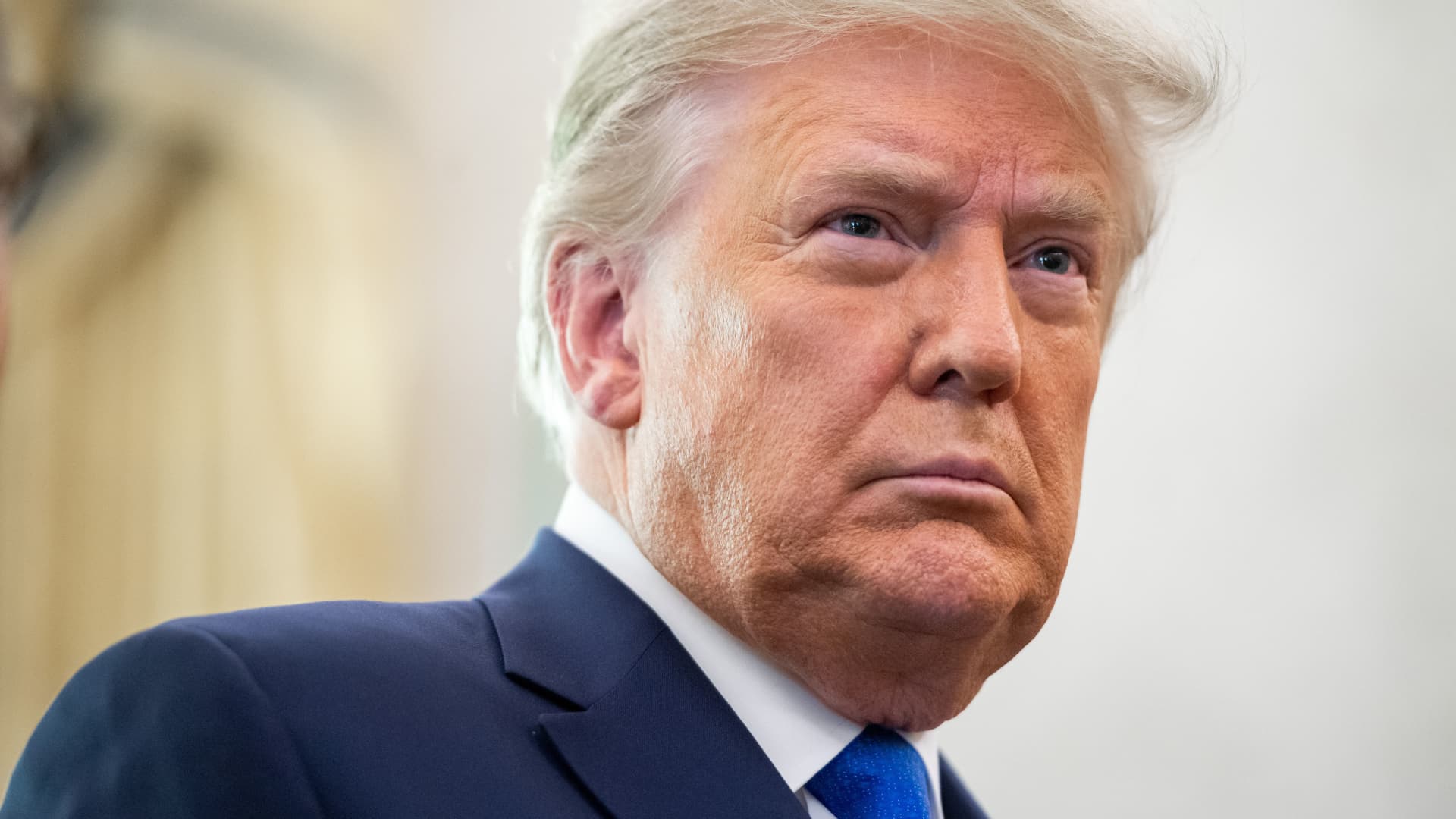
President Donald Trump called Pfizer's coronavirus vaccine "a medical miracle" that "will save millions of lives and soon end the pandemic once and for all."
"We have delivered a safe and effective vaccine in just nine months. This is one of the greatest scientific accomplishments in history," Trump said in a video statement from the White House after the Food and Drug Administration granted emergency use authorization to the Covid-19 vaccine produced by Pfizer and BioNTech.
Trump said that the vaccine, which was set to begin being administered 24 hours after the FDA approval on Friday, should go first to "our senior citizens, health-care workers and first responders to be first in line."
"This will quickly and dramatically reduce deaths and hospitalizations," he said.
Using a term for the coronavirus that many consider racist, Trump said, "When the China virus invaded our shores, I promised that we would produce a vaccine in record time, before the end of the year."
"They said it couldn't be done. But, with [this] announcement, we have now achieved that goal," Trump said.
"As I've said from the beginning, a vaccine will vanquish the virus and return life back to normal. The pandemic may have begun in China, but we are ending it right here in America," he said.
— Dan Mangan
'Foolhardy' to assume one dose might be sufficient, FDA official says
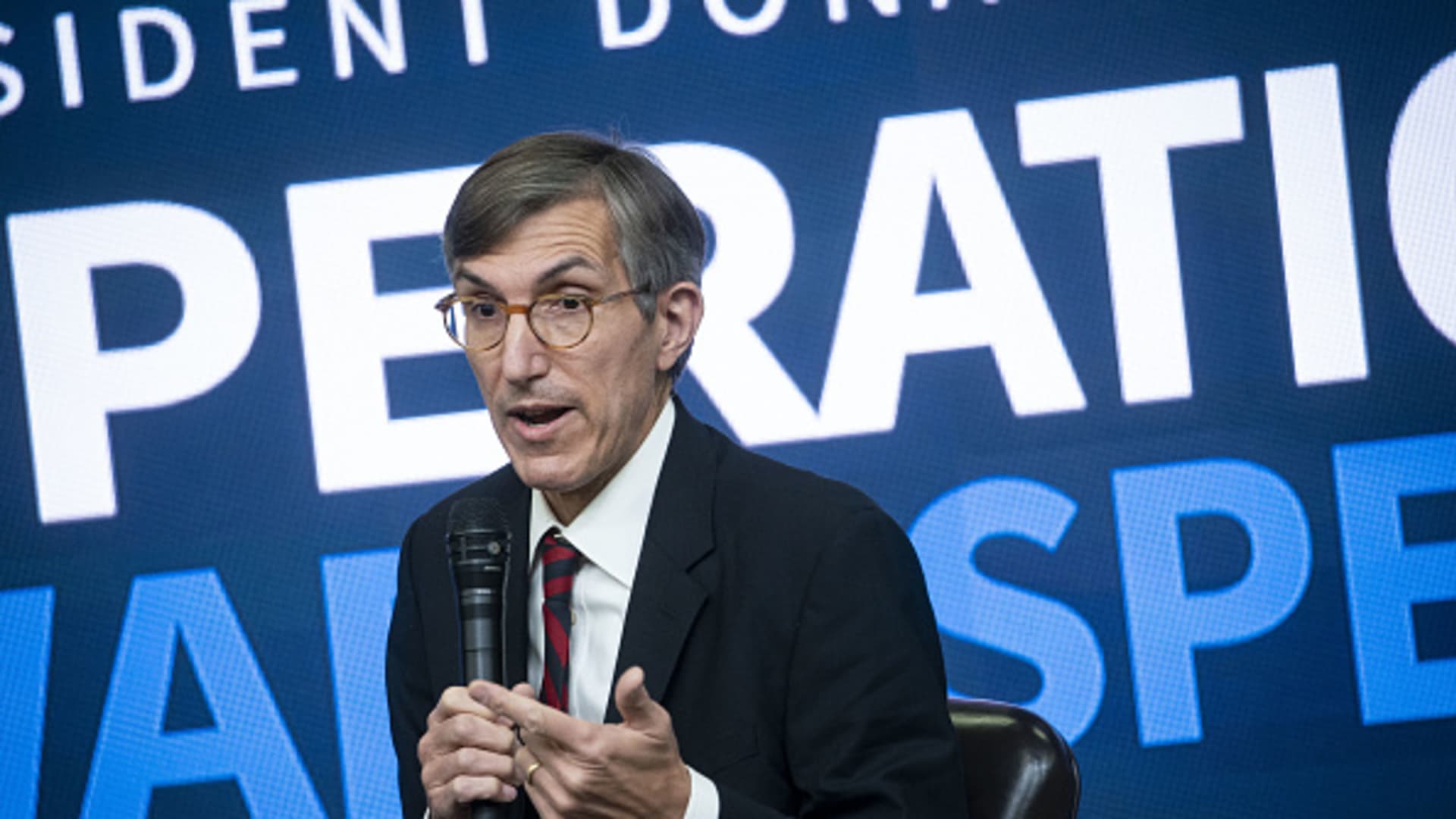
The FDA has reiterated its recommendation that patients receive two doses of the vaccine, warning against speculation that a single dose might provide sufficient protection.
Dr. Peter Marks, director of the Center for Biologics Evaluation and Research at the FDA, told reporters that those who participated in clinical trials received two doses, and the FDA's recommendations are based on the scientific data from studying the two-dose regimen.
"We spent so much time carefully reviewing the data and basing decisions on science that it seems pretty foolhardy to conjecture that one dose might be okay without knowing," Marks said.
"At least from an FDA perspective, we would be recommending that people complete the two-dose series so that we actually know they are truly protected at the rate of approximately 95% efficacy that was reported," Marks said.
— Spencer Kimball
Pelosi calls for quick, fair and free distribution of Covid vaccine to as many Americans as possible
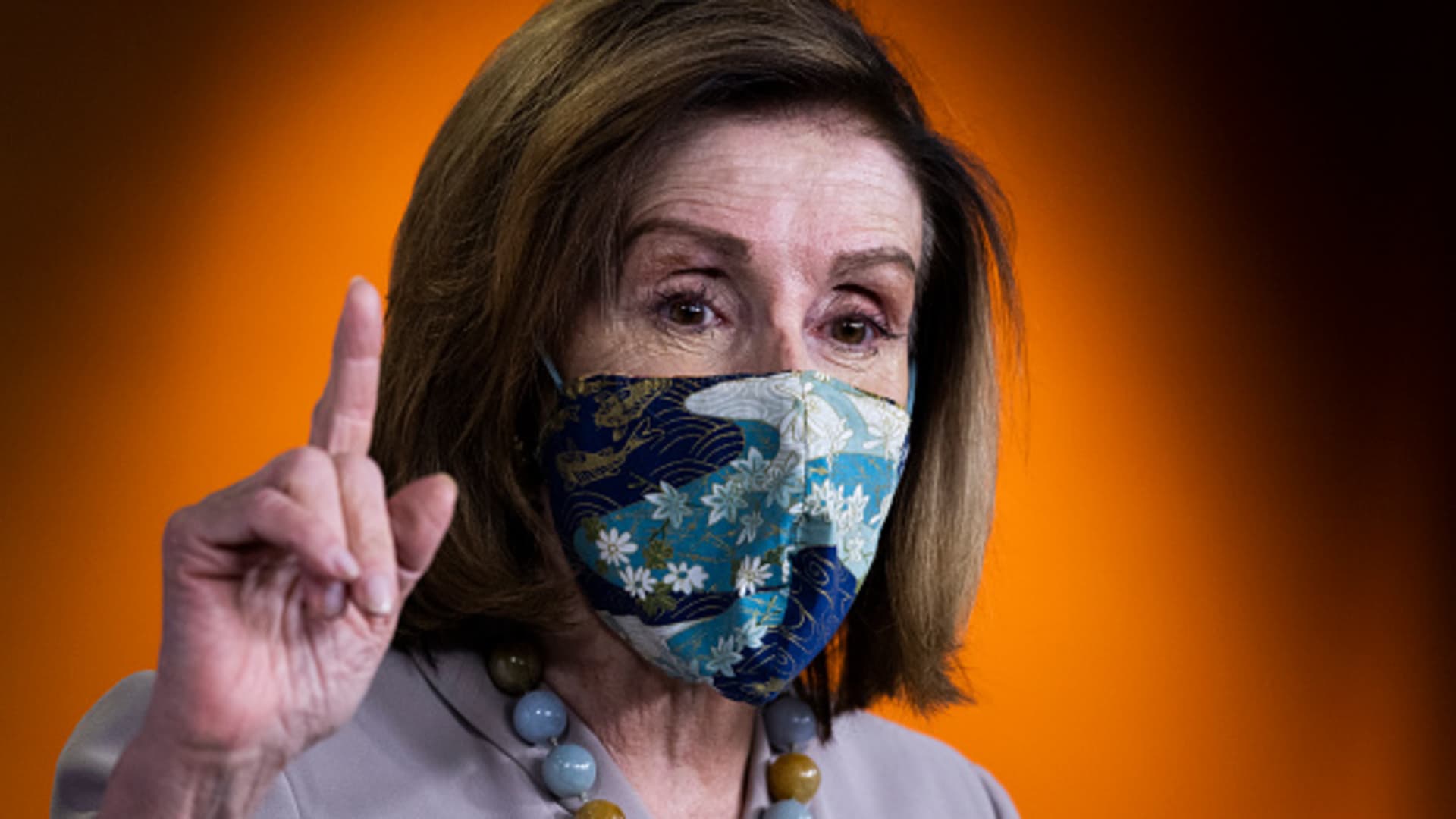
House Speaker Nancy Pelosi called for the coronavirus vaccine that has been granted emergency use approval by the Food and Drug Administration to be distributed quickly, freely and fairly to "as many Americans as possible."
Pelosi, D-Calif., also said the Defense Production Act should be invoked to accelerate the manufacturing of the vaccine made by Pfizer and BioNTech. The act authorizes the president of the United States to require companies to accept contracts to produce materials.
"Americans should have full confidence in this vaccine knowing that it has been reviewed and recommended by the independent experts of the FDA's advisory panel," Pelosi said in a statement.
"We must ensure that the vaccine will be free and distributed in a fair and equitable manner to as many Americans as possible as soon as possible," she said. "With vaccine distribution being administered by the states, state and local funding is also central to our efforts to crush the coronavirus."
Pelosi also said that that until the vaccine is widely available, Americans should continue embracing "the testing, tracing, treatment, mask wearing and social distancing that are essential to preventing thousands of Americans from dying every day from the pandemic."
— Dan Mangan
FDA chief says Pfizer vaccine authorization not due to 'external pressure'
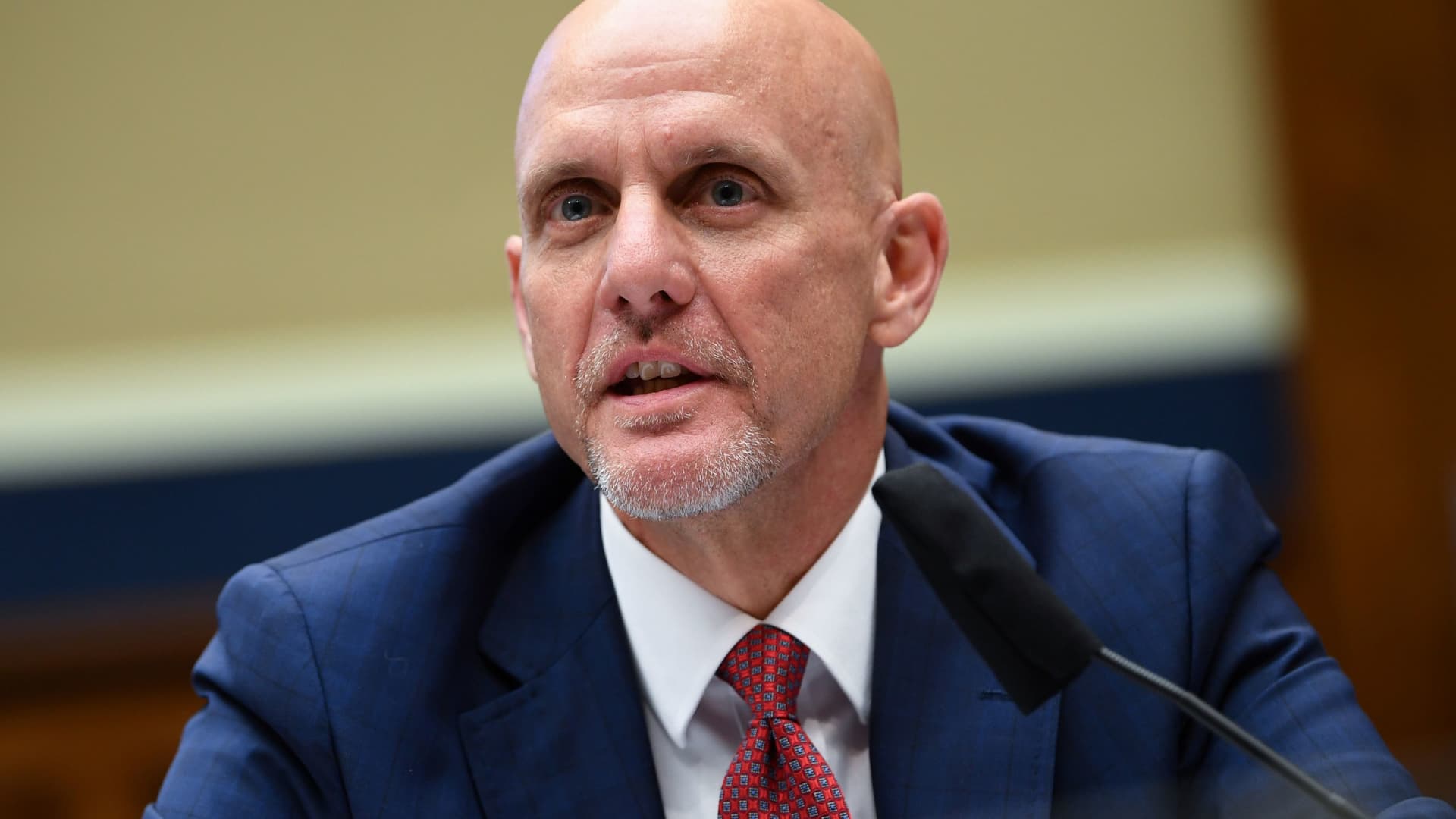
Dr. Stephen Hahn, commissioner of the U.S. Food and Drug Administration, emphasized during a press briefing that "science and data guided the FDA's decision" to grant Pfizer's vaccine emergency authorization and called reports that he would be fired if the drug wasn't immediately authorized "inaccurate."
"Science and data guided the FDA's decision. We worked quickly based on the urgency of this pandemic, not because of any other external pressure," Hahn said during a press briefing. "This decision was based on the strongest scientific integrity, and I'm so proud of the work that our career scientists have done."
On Friday, The Washington Post first reported that White House chief of staff Mark Meadows told Hahn to submit his resignation if the agency didn't clear the vaccine for emergency use by the end of the day. In a statement following the report, Hahn called the report "an untrue representation" of his conversation with Meadows.
"The representations in the press that I was threatened to be fired if we didn't get it done by a certain date is inaccurate," Hahn said at the briefing on Saturday.
— Noah Higgins-Dunn
Covid-19 deaths could nearly double by April despite vaccines
Health researchers warn that the country's Covid-19 death toll could nearly double in upcoming months, even with a vaccine set to roll out.
The U.S. will likely see a cumulative 539,000 deaths by April 1, according to a recent report published by the Institute for Health Metrics and Evaluation at the University of Washington's School of Medicine.
The anticipated vaccine would reduce the number of deaths by 9,000 before April 1, but a rapid vaccine rollout targeting high-risk individuals could save 14,000 more lives, the report said.
— Emma Newburger
Who will get the first doses of vaccine?
The first group of Americans outside of clinical trials could be inoculated against Covid-19 in the coming days.
In early December, a key Centers for Disease Control and Prevention panel, known as the Advisory Committee on Immunization Practices, voted 13-1 to give health-care workers and long-term care facility residents the first vaccine doses once cleared for public use.
Dr. Nancy Messonnier, director of the CDC's National Center for Immunization and Respiratory Diseases, said most states and local jurisdictions expect it to take three weeks to vaccinate all of their health-care workers.
— Noah Higgins-Dunn
U.S. government plans to distribute 2.9 million vaccine doses in 24 hours
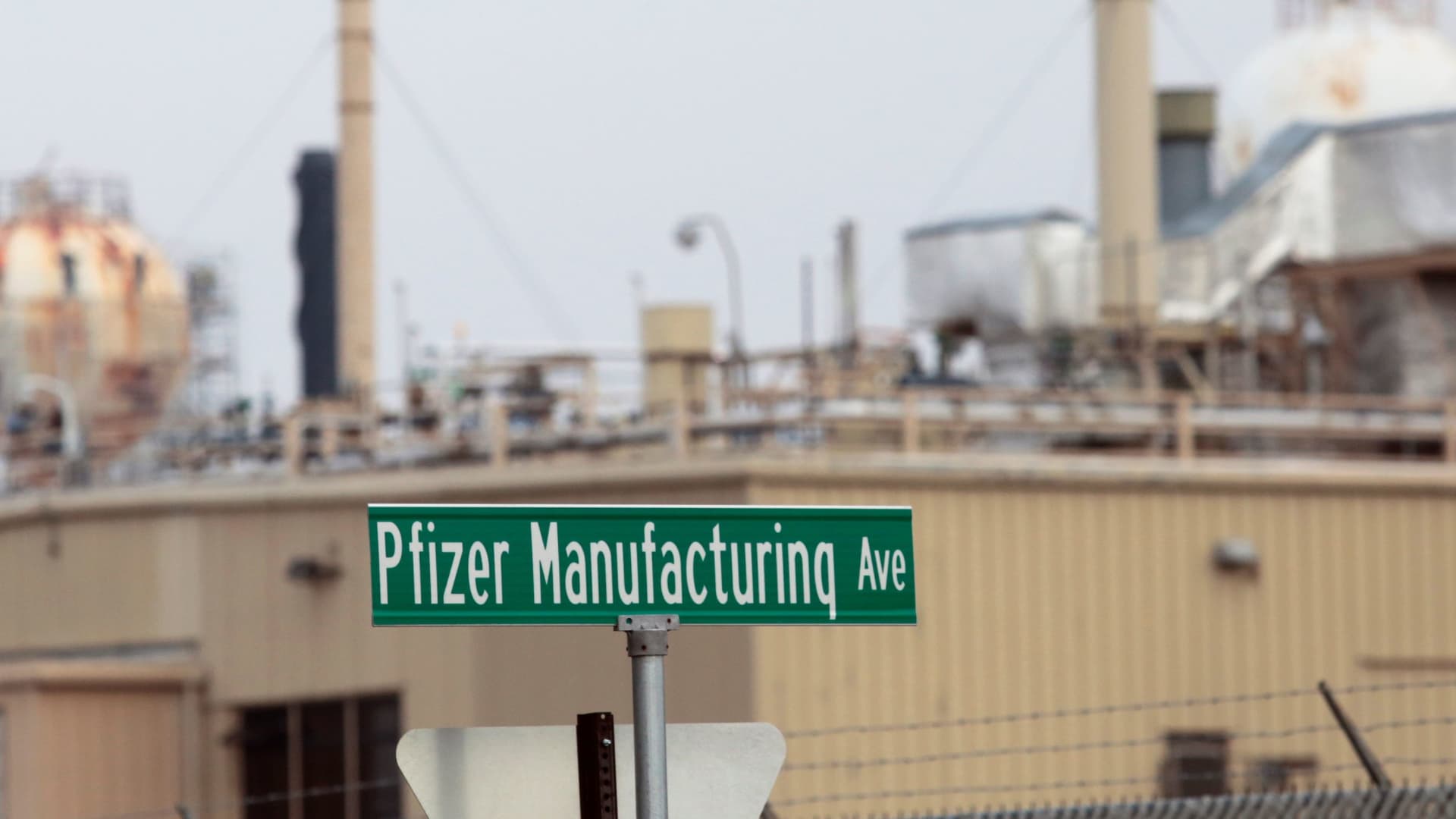
The federal government's vaccine distribution plan will kick into gear now that the Food and Drug Administration has granted emergency use authorization for Pfizer's vaccine.
The government plans to distribute 2.9 million doses of the vaccine within 24 hours. Another 2.9 million doses will come 21 days later for patients to get their second shot, according to Gen. Gustave Perna, who is overseeing the logistics for Operation Warp Speed.
Pfizer plans to ship 50 million doses of the vaccine this year, which is enough to immunize 25 million people due to the two-dose protocol.
Dr. Anthony Fauci, director of the National Institute of Allergy and Infectious Diseases, has said the U.S. could have enough vaccine doses for every American by April.
— Spencer Kimball
Correction: The U.S. government will begin distributing vaccines doses in the next 24 hours. A previous version of this post used incorrect terminology.



